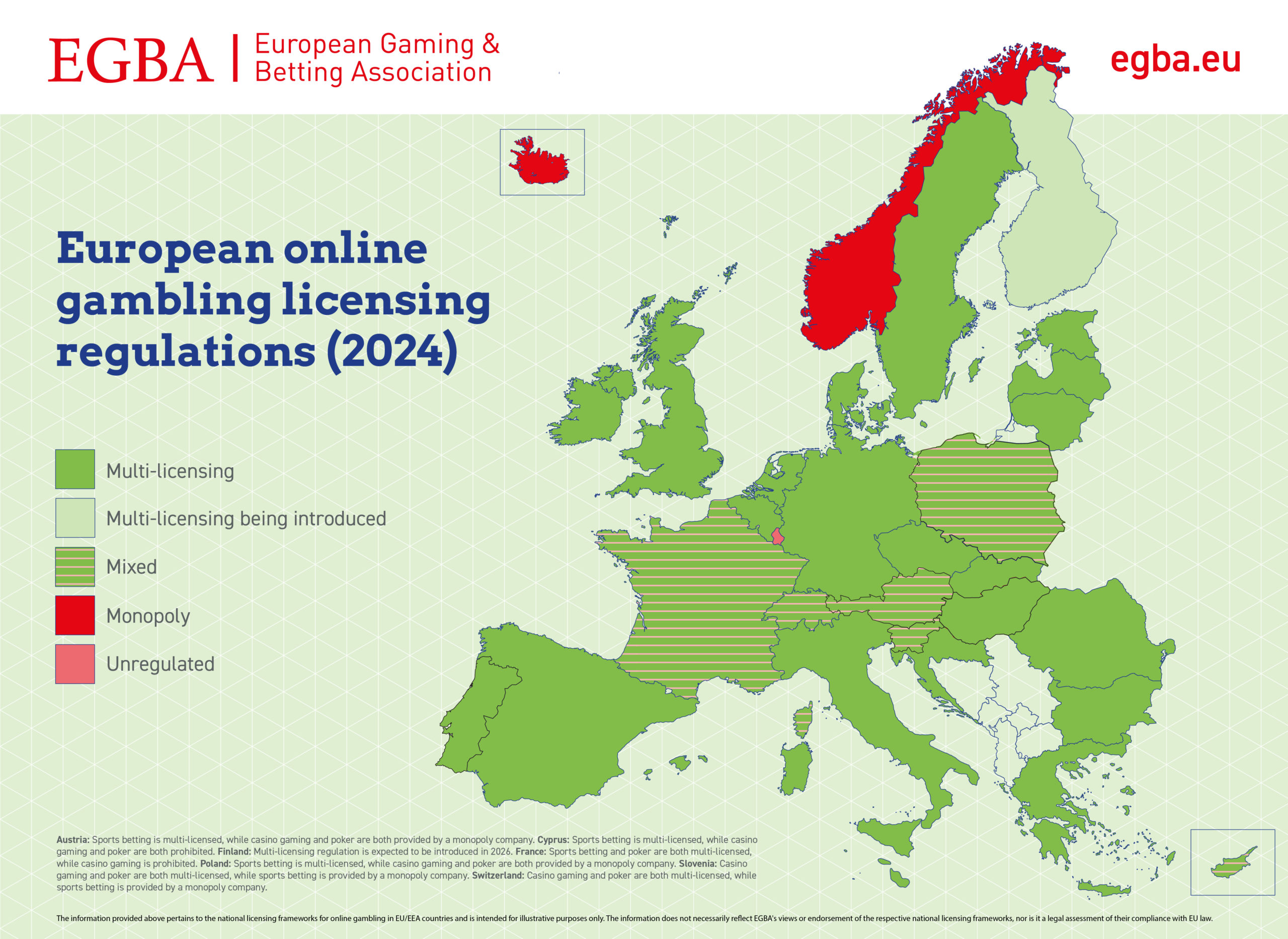Licensing
Europe’s online gambling sector is highly regulated. Online gambling companies obtain licenses—often multiple licenses, each with its own compliance requirements—to operate and provide services in European countries.
In the past, European countries had either no regulations specifically for online gambling or only state monopolies were allowed to offer online gambling in those countries, but today the overwhelming majority of countries have adopted multi-license regimes which allow both private and publicly owned companies to obtain a license to operate in a country.
Multi-licensing has now been adopted in 27 out of 31 European countries, with 23 countries having introduced full multi-licensing for all regulated online gambling products. This shift towards multi-licensing regimes has been positive and instrumental in establishing well-regulated and competitive online gambling markets which are attractive and provide choice to players.
Many licenses are often required
While nearly all European countries have adopted some form of multi-licensing regime, each country maintains its own licensing rules for online gambling. These rules often differ significantly in character (e.g. the number of licenses allowed in the country; the types of products that a license allows a company to offer to customers in that country) and have their own compliance requirements.
Some European countries require companies to possess one online gambling license to offer all online gambling products allowed in that country, however many countries require companies to obtain individual licenses to offer specific and different online gambling product groups, such as poker or sports betting, that are allowed in that country.
An online gambling company is therefore required to hold multiple licenses to supply the same game or product (e.g. poker) in different European countries, despite the product or game on offer not being different in character or terms.
These varying licensing requirements create administrative challenges and costs for online gambling companies that offer multiple products across several European countries. EGBA’s member operators collectively hold 321 online gambling licenses across 21 European countries—each license with its own rigorous compliance requirements.
Licensing rules impact the choice available to players
The number of online gambling licensees permitted in a country directly impacts the choices available to players. The online gambling market is, like most online markets, consumer-driven and highly sensitive to prices. If a player cannot find competitive betting odds, or the products or companies they prefer, within the licensed market, they may look towards international websites based outside their country.
This can lead the player to access websites that are either licensed and regulated elsewhere in Europe, otherwise known as the “grey market”, or, worryingly, with websites that are based outside Europe that are neither licensed, regulated nor pay tax in Europe and do not offer players the consumer protection guarantees which exist on websites that are regulated in European countries.
A lack of competitive betting odds, product offerings or companies can lead to an uncompetitive market and is one of the reasons why, for instance, monopolies in the online sector are failing.
The choices available to players determine the success of regulation
For a country’s online gambling regulation to succeed, it must achieve the highest possible share of its players playing within the online gambling websites which are licensed, regulated and supervised in that country.
This ensures that all players are protected by the consumer protection regulations in that country, the national authorities can regulate their country’s gambling activity and can generate the optimum amount of gambling tax revenues, and online gambling companies are required to comply with local licensing obligations.
To facilitate this, national online gambling regulations should: support consumer choice by enabling market competition through multi-licensing; avoid restrictive measures that make offshore markets more attractive; and establish regulations that encourage operators to apply for domestic licenses.
Key facts
- Multi-licensing has been adopted in 27 out of 31 European countries, with 23 countries having introduced full multi-licensing for all regulated online gambling products.
- EGBA members adhere to the highest regulatory standards, collectively holding 321 online gambling licenses across 21 European countries—each license with its own rigorous compliance requirements.

